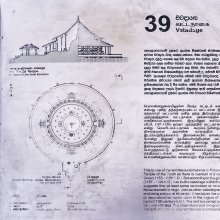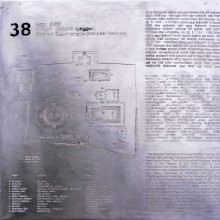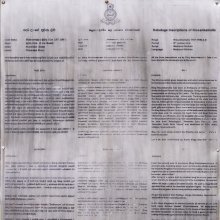Tam, Ṭāṃ, Tām: 14 definitions
Introduction:
Tam means something in Hinduism, Sanskrit, the history of ancient India, Marathi, Jainism, Prakrit, Hindi, Tamil. If you want to know the exact meaning, history, etymology or English translation of this term then check out the descriptions on this page. Add your comment or reference to a book if you want to contribute to this summary article.
Tam has 14 English definitions available.
Images (photo gallery)
Languages of India and abroad
Sanskrit dictionary
[Deutsch Wörterbuch]
Source: Cologne Digital Sanskrit Dictionaries: Böhtlingk and Roth Grosses Petersburger WörterbuchTam (तम्):—
--- OR ---
Tam (तम्):—kein Lebenszeichen von sich geben, sich nicht rühren, von zwei Schmollenden [Spr. 530.] — ava, avatānta ohnmächtig [Taittirīyasaṃhitā 5, 6, 2, 2.] — ni, nitānta [Prātiśākhya zur Taittirīyasaṃhitā 16, 23.] nitāntam ganz und gar, durchaus [Rājataraṅgiṇī 1, 310.]
--- OR ---
Tam (तम्):—mit pra caus. pratamaṭya [Patañjali a. a. O. 6 (4), 14],a.
Source: Cologne Digital Sanskrit Dictionaries: Sanskrit-Wörterbuch in kürzerer FassungTam (तम्):—, tāmyati (metrisch auch Med.) , Partic. tānta. —
1) den Athem verlieren , ersticken ; betäubt — , ohnmächtig werden , exanimari , erschöpft sein , vergehen , ausser sich sein , sich nicht zu helfen wissen , aus der Haut fahren mögen. na mā tamat impers. —
2) stocken , unbeweglich — , starr — , hart werden (Vom Körper , seinen Gliedern und Functinen). —
3) kāṅkṣāyām. — Caus. tamayati ersticken (trans.) , der Luft berauben. — Mit ava, avatānta ohnmächtig. — Mit ā —
1) exanimari , vergehen , ausser sich sein , sich nicht zu helfen wissen [Kād. (1872) 2,13,10.] —
2) unbeweglich — , starr werden [Bālarāmāyaṇa 83,15.] — Mit ud = ā — Mit ni, tānta ausserordentlich , bedeutend ; m und nitānta Adv. in hohem Grade , überaus , sehr , heftig , ganz und gar , durchaus. — Caus. ersticken (tran.) [Āpastamba’s Śrautasūtra 5,17,8.] — Mit pari beklommen werden. — Mit pra athemlos — , beklommen — , betäubt werden , sich erschöpft fühlen , vergehen , ausser sich sein. — *Caus. Absol. pratamayya. — Mit atipra = pra verstärkt. — Mit sam sich aufreiben , — verzehren.
Sanskrit, also spelled संस्कृतम् (saṃskṛtam), is an ancient language of India commonly seen as the grandmother of the Indo-European language family (even English!). Closely allied with Prakrit and Pali, Sanskrit is more exhaustive in both grammar and terms and has the most extensive collection of literature in the world, greatly surpassing its sister-languages Greek and Latin.
See also (Relevant definitions)
Starts with (+1431): Bodhidharma, Tam bra, Tam Jivam Tam Sariram Sutta, Tam lang, Tam loeng, Tam mu sa, Tam nai, Tam naji, Tam that, Tam ye meao, Tam ye tuapa, Tam-barki, Tam-fa-tu, Tam-hidi, Tam-seetapandu, Tam-tomenal, Tam-yae, Tam-yae-chang, Tam-yae-khrua, Tam-yae-tua-mae.
Ends with (+4194): A-car-kariyavatam, A-dhyatam, A-patamattam, A-piracittacampantam, A-vitam, Abhidutam, Abhimarutam, Abhininartam, Abhinivartam, Abhishankitam, Abhivatam, Abhivyaktam, Abhyastam, Abhyavartam, Acakantam, Acamantam, Acamarutam, Acamatam, Acamimarattam, Acammatam.
Full-text (+4463): Tams, Abhilashita, Avanata, Gatagata, Pratam, Jhatajhata, Anihita, Tamkrita, Nitanta, Purata, Khallita, Ghataghata, Apavarita, Bhakshita, Vilambita, Parkata, Avatamsa, Vyudhakankata, Pragrata, Anudita.
Relevant text
Search found 200 books and stories containing Tam, Ṭāṃ, Tām, Ṭaṃ, Taṃ; (plurals include: Tams, Ṭāṃs, Tāms, Ṭaṃs, Taṃs). You can also click to the full overview containing English textual excerpts. Below are direct links for the most relevant articles:
Brihad Bhagavatamrita (commentary) (by Śrī Śrīmad Bhaktivedānta Nārāyana Gosvāmī Mahārāja)
Verse 2.3.115 < [Chapter 3 - Bhajana (loving service)]
Verse 2.1.141 < [Chapter 1 - Vairāgya (renunciation)]
Verse 2.1.87 < [Chapter 1 - Vairāgya (renunciation)]
Garga Samhita (English) (by Danavir Goswami)
Verses 5.24.15-16 < [Chapter 24 - The Killing of the Kola Demon]
Verse 2.21.39 < [Chapter 21 - The Rāsa-dance Pastime]
Verse 5.7.23 < [Chapter 7 - The Killing of Kuvalayāpīḍa]
The Agni Purana (by N. Gangadharan)
Chapter 201 - Mode of worshipping Viṣṇu in a figure of nine compartments
Chapter 316 - Narration of different kinds of mantras
Chapter 314 - Mantras relating to the worship of Goddess Tvaritā
Rig Veda (translation and commentary) (by H. H. Wilson)
Bhakti-rasamrta-sindhu (by Śrīla Rūpa Gosvāmī)
Verse 3.3.55 < [Part 3 - Fraternal Devotion (sakhya-rasa)]
Verse 4.9.6 < [Part 9 - Incomplete Expression of Mellows (rasābhāsa)]
Verse 2.4.142 < [Part 4 - Transient Ecstatic Disturbances (vyābhicāri-bhāva)]
Hari-bhakti-kalpa-latikā (by Sarasvati Thkura)
Related products





